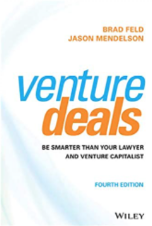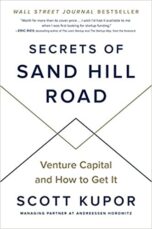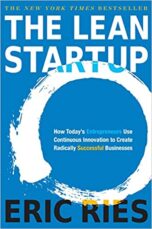EARLY STAGE Toolbox
Articles, Presentations, & Videos
Article
For Founders - Development Stage
Tax Traps for Start-Ups with No Income Tax Traps for Start-Ups with No Income
Article
For Founders - Development Stage
So you want to start a DAO? Distributed distraction or next level?
External Resources
-
Books

Venture Deals: Be Smarter Than Your Lawyer and Venture Capitalist
“Brad Feld and Jason Mendelson are back with version four of their Wall Street Journal and Amazon bestseller. Packed with the latest insights and emerging trends, the authors’ fifty-plus years of collective experience are at your fingertips. Whether you need advice on raising money, negotiating a term sheet, selling your business, or really just want to have insider access into what makes venture capitalists tick, this book is for you.”

Secrets of Sand Hill Road: Venture Capital and How to Get It
“Whether you’re trying to get a new company off the ground or scale an existing business to the next level, you need to understand how VCs think. In Secrets of Sand Hill Road, Kupor explains exactly how VCs decide where and how much to invest, and how entrepreneurs can get the best possible deal and make the most of their relationships with VCs.”

The Lean Startup: How Today’s Entrepreneurs Use Continuous Innovation to Create Radically Successful Businesses
A staple in the startup collective mind, “The Lean Startup approach fosters companies that are both more capital efficient and that leverage human creativity more effectively. Inspired by lessons from lean manufacturing, it relies on ‘validated learning,’ rapid scientific experimentation, as well as a number of counter-intuitive practices that shorten product development cycles, measure actual progress without resorting to vanity metrics, and learn what customers really want. It enables a company to shift directions with agility, altering plans inch by inch, minute by minute.”
-
Templates
Founders Agreement
This template Founders’ Collaboration Agreement aids founders in aligning strategic goals, determining ownership structure, and establishing how key decisions are to be made.
YC Post-Money Safe
Y Combinator provides three versions of the post-money safe intended for use by US-based companies, plus an optional side letter. These forms are frequently used but are somewhat biased toward investors.
Series Seed Financing Documents
These financing documents are straightforward and structured for Series Seed and earlier priced rounds.
NVCA Model Legal Documents
The NVCA Model Legal Documents are built as model documents for venture capital financings. These forms are frequently used in Series A and later rounds and tend to be investor friendly.
S3 Ventures Cap Table
This cap table template helps founders easily build out detailed cap tables, including use of stock options, projecting out a next round of financing after raising money on SAFEs and convertible notes, etc.
Tech Contracts Academy
This resource provides templates and guides for multiple contracts, including SaaS agreements, software license, data processing addendums, and non-disclosure agreements. Most forms require at least some customization.
Privacy & Terms Templates
Termly offers free templates and accompanying guides for privacy policies, terms and conditions, and more.
Draft Term Sheet for Angels
A Draft Term Sheet Template intended for use by angel groups leading a priced round.
SPV Fund Docs
Assure distributes its template SPV fund document for use in startup investing. These templates are very general and require customization but are a good place to start and get familiar with fund documents.
-
Blogs & Newsletters
First Round Review
A fantastic blog hosted by First Round Ventures, which tends toward long-form, more academic content.
The AVC Blog
Fred Wilson is a VC at Union Square Ventures and authors the AVC blog (and is very active on Twitter). Fred’s posts cover a wide range of highly relevant topics and are highly recommended.
What Matters in Tech?
“Stepping back from the noise, I try to work out what’s really happening, what matters, and what it might mean.”
Axios Pro Rata
A daily email newsletter that helps readers “Dive into the world of dealmakers across VC, PE and M&A. By Dan Primack, the best-sourced deals reporter, with a weekend edition by Kia Kokalitcheva.”
The Angel Podcast, by Jason Calacanis
One of the most prolific podcasters in Angel investing, Jason angels and VCs about their investment strategies, biggest hits, and more.
Village Global’s Venture Stories
“Village Global’s Venture Stories takes you inside the world of venture capital and technology, featuring enlightening interviews with entrepreneurs, investors and tech industry leaders.”
-
Software & Calculators
Startup Equity Calculator
An equity calculator to help determine how to split up equity between founders. The calculator is free, but it requires your email address and a subscription to marketing emails.
Cart Launch
Carta’s free cap table tool for the earliest founders, Carta Launch provides startup tools to help founders raise funds and issue equity.
Microsoft for Startups Founders Hub
This application-only program from Microsoft provides free Microsoft tools, Azure credits, partner offers, and exclusive guidance for tech startups.
-
Other Tools
The Harvard Startup Guide
Harvard’s Startup Guide provides an overview of key questions entrepreneurs face and key factors for success.
YC Series A Guide
Y Combinator’s Series A Guide includes insights about how to succeed in raising capital, specifically in a Series A round.
Glossary of Terms
-
1x
Referring to a one times multiple, often in reference to liquidation preferences, returns on investment, etc.
More Info
-
4 Years with a 1-Year Cliff
Founder, advisor, and employee startup equity grants are usually subject to a vesting schedule over a period of four years, with 25% of the grant vesting altogether after the first year (a “cliff”), with the remainder vesting monthly for the remaining three years.
-
409A Valuation
Section 409A of the Internal Revenue Code regulates the treatment of non-qualified deferred compensation to service providers for federal income tax purposes. A company must issue stock options at fair market value in order to legitimately benefit from this section of the code and will typically hire a third-party agency to issue a report determining exactly what that is. The report is commonly known as a 409A valuation and they are critical to issuing stock options for a venture backed company. Most startups order at least one per year, or after a material financing event, whichever is sooner.
-
83(b) Election
A 409A valuation is a third-party assessment of the fair market value (FMV) of the common stock of a private company. Startups often pay for these assessments to enable them to offer equity to employees on a tax-free basis.
-
Accelerated Vesting
Accelerated vesting permits an employee, usually upon termination without cause or a sale of the company, to speed up the schedule for gaining access to restricted company stock or stock options issued as an incentive.
-
Acceleration Clause
An acceleration clause is a contract term, usually trigged by a default or breach of contract, which requires debt owed over time to be owed immediately.
-
Accelerator
A startup accelerator is a program that supports early-stage companies by mentoring, training, and financing participating startups.
-
Accredited Investor
An accredited investor is an individual or a business entity that is allowed to invest in certain private offerings. To have this privilege, an individual must satisfy requirements regarding her income or net worth.
-
Acquihire
An acqui-hire is when Company A acquires Company B with the main purpose of the acquisition being taking Company B’s employees. This is a common exit opportunity for tech startups.
More Info
-
Advisor Agreement
An advisor agreement outlines obligations and expectations between a startup company and a board advisor.
-
Advisory Board
An advisory board is composed of persons with knowledge, experience, and influence, and acts as a sounding board for founders.
-
Alpha Testing
Alpha testing is the testing of a pre-production model to identify possible bugs prior to making the product available to early customers.
-
Angel Financing
Angel financing is a financing round where Angel Investors provide capital to companies in exchange for equity in the company.
More Info
-
Angel Investor
An angel investor is a high-net-worth individual who provides financing to startups, as well as mentoring, networking and knowledge.
-
Annual Contract Value (ACV)
Annual contract value (ACV) is the annual revenue generated from a customer contract, excluding fees.
-
Annual Recurring Revenue (ARR)
Annual recurring revenue (ARR) is the revenue that a company generates from its customers, normalized on an annual basis.
More Info
-
Anti-Dilution
Anti-dilution is a right (usually requested by investors) to shield investors from future rounds where the shares are sold at a cheaper price than that paid by earlier investors in the same stock.
-
Articles of Incorporation (AOI)
Articles of incorporation (AOI) are the primary organization documents of a corporation.
-
As Converted Basis
As converted basis is the calculation of shares assuming that all preferred shares have been converted into some number of common shares.
-
Asset Acquisition
An asset acquisition is a transaction where Company A buys Company B by purchasing Company B’s assets, rather than Company B’s stock.
-
Associate (VC Firm)
The responsibilities of VC associates include finding deals, meeting entrepreneurs, and evaluating business ideas.
-
At-Will Employee
An at-will employee can be terminated by a company at anytime for any or no reason without adverse legal consequences. Similarly, the employee can leave the company at any time for any or no reason without adverse legal consequences.
More Info
-
Authorized Shares
Authorized shares are the maximum number of shares that the startup can issue, as set forth in its Articles of Incorporation.
-
Automatic Conversion
An automatic conversion clause, often found in convertible notes, permits the automatic conversion of preferred stock or convertible debt into common stock in the company, triggered by certain events.
More Info
-
B-Corporation
B-Corporations or “benefit corporations” are companies that voluntarily meet high standards of social and environmental performance. They must complete a comprehensive assessment and have it be verified by B Lab, a non-profit organization.
-
Backup Certificate
A back-up certificate is a certificate a company will issue to its lawyers certifying certain facts that its lawyers will need issue an opinion letter.
-
Balance Sheet
A balance sheet is a financial statement that gives a summary of a company’s assets, liabilities, and shareholder equity at a specific point in time.
-
Bankruptcy
Bankruptcy is a legal proceeding undertaken when a company cannot repay it outstanding debts. The process begins when the debtor files a petition. The debtor’s assets are then assessed, and the assets may be used to repay the outstanding debt.
-
Benchmark
A benchmark is a standard against which the performance of a company can be measured. company financing is regularly tied to meeting such standards.
-
Best Alternative to Negotiated Agreement (BATNA)
A best alternative to negotiated agreement (BATNA) is the company’s alternative if negotiations with investors fail and an agreement cannot be made.
More Info
-
Beta Testing
Beta testing is the last round of testing prior to releasing a product, with the objective being to iron out usability issues.
More Info
-
Blanket Lien
A blanket lien is a lien that gives a creditor the right to seize, if the debtor defaults, all of the debtor’s assets serving as collateral.
-
Bleeding Edge
Bleeding edge refers to a product, service, or technology, that is on the forefront of development.
-
Blended Preferences
A company has Blended Preferences when each class of its preferred stock has equivalent liquidation preference rights.
-
Blue Sky Laws
Blue sky laws are state securities regulations, which typically require issuers of new securities to register their offerings and report certain details of the transaction.
-
Board Consent
Board consent is the permission that a company needs to obtain from its Board of Directors to take certain actions. Consent can usually be obtained in writing or at a meeting.
-
Board Observer
A board observer may attend and participate in some meetings or portions of meetings of the board of directors but cannot vote on matters before the board.
-
Board of Directors
A board of directors is a group of persons elected by shareholders and is responsible for making decisions on behalf of the company.
-
Boilerplate
The term boilerplate refers to standard contractual provisions used to increase efficiency in contract negotiations.
-
Book Value
Book value can be thought of as the net asset value of a company, calculated as its total assets minus liabilities and intangible assets.
-
Bootstrapping
Bootstrapping is when an entrepreneur starts a company from personal finances or the operating revenues of the startup and/or foregoes angel investor venture capital financing.
-
Breakup Fee
A breakup fee requires a prospective purchaser to compensate a company if the prospective purchaser backs out of a financing round. Note that this is rare.
-
Bridge Financing
Bridge financing is an interim financing option (often in the form of a loan, SAFE or convertible note round) utilized by companies to shore up their short-term financial position until they can raise the next round of capital.
More Info
-
Bring Down Certificate
A bring down certificate certifies that the representations and warranties that were made by the startup at signing are still true as of the date of the certificate.
-
Broad-Based Weighted Average
The broad-based weighted average is an anti-dilution provision that adjusts the preferred stockholder’s conversion price in additional financing rounds to a lower price per share, thereby protecting preferred shareholders when subsequent offerings are made by the company.
-
Burn Rate
The burn rate is the rate at which a company is spending the capital it raised to cover expenses before generating positive cash flow from operations.
-
Bylaws
Bylaws are the rules a company adopts which stipulate how corporate matters will be governed.
-
Capital Call
A capital call is a legally enforceable process in which funds ask each fund investor to contribute the portion of committed capital that is due. The rules of the capital calls and timing of capital contributions are typically found in a fund’s limited partnership agreement.
More Info
-
Carried Interest
Carried interest describes what will be paid to the manager of a fund (usually a percentage of returns on investment).
More Info
-
Charter
A charter refers to a company’s primary governing document.
-
Churn Rate
The churn rate describes the rate at which customers cease doing business with a company (most often used by companies operating on a subscription models).
-
Co-Sale
Co-sale (or “tag-along”) rights permit minority shareholders to join in when majority shareholders sell their stock.
More Info
-
Convertible Note
A convertible note starts as short-term debt that can be converted into equity in a company, usually upon the occurrence of a priced equity round.
More Info
-
Data Room
Data rooms are online repositories where confidential documents can be stored; access to the room is limited to authorized persons.
More Info
-
Drag Along Rights
A drag-along right enables a majority stockholder to force a minority stockholder to participate in the sale of a company.
-
Dry Powder
Dry powder refers to cash or cash commitments kept on hand by a VC firm to make investments.
-
Due Diligence
Due diligence is a review process performed by an investor or acquirer to confirm details or facts regarding a company prior to making an investment.
-
Employee Stock Option Plan (ESOP)
An employee stock ownership plan (ESOP) is an employee benefit plan that grants employees stock in the company, usually by means of stock options and/or restricted stock and more.
-
Form D
Form D is used to file a notice of an exempt offering of securities with the SEC if relying on exemptions under Regulation D of the Securities Act.
More Info
-
Fully Diluted Basis
Refers to calculating the total number of outstanding shares of a company after all options and convertible instruments have been exercised.
-
Incentive Stock Option (ISO)
An incentive stock option (ISO) gives founders and/or key employees the right to buy company stock at a discounted price with the added benefit of potential tax breaks on the profit.
-
Indemnification Cap
An indemnification cap is a cap on liability (i.e., the maximum dollar amount a party will be required to pay for breaching a contract).
-
Indemnity
An indemnity is an agreement between two parties where one party agrees to pay for potential losses of the other or damages regardless of who caused the losses or damages. These can be one-sided or mutual.
-
Independent Contractor
An independent contractor is a self-employed person or entity contracted to provide services to a company as a non-employee. The laws and guidelines between contractor and employee can be troublesome if structured incorrectly.
-
Information Rights
Information rights require a company to provide investors with financial statements and other company information.
-
Investment Company Act
The Investment Company Act regulates investment companies and the activities they engage in and sets standards for the investment company industry.
-
Investment Thesis
An investment thesis is a fund’s principles guiding its particular investment strategy.
-
Issuer
An issuer is company that sells or otherwise issues securities pursuant to an equity grant, fundraise, or other event.
-
Lead Investor
A lead investor is the investor who will lead a funding round by investing the most money and negotiating the terms on behalf of the other investors.
More Info
-
Letter of Intent (LOI)
A letter of intent (LOI) is a non-binding letter that outlines the material terms of a prospective deal.
-
Lifestyle Company
A lifestyle business has the goal of sustaining a particular level of profit and no more. Venture capitalists are unlikely to invest in this type of company.
-
Limited Partner (LP)
Limited partners or “LPs” are individuals and organization that invest in a VC fund.
-
Major Investors
A major investor is an investor who owns a large percentage of shares in a company, as defined by a number of shares or percentage of the company owned, entitling them to certain rights, such as information rights.
-
Micro VC
A micro VC is a small venture firm with a fund size typically <$50MM and typically only invests between $25K to $500K in a given company.
More Info
-
Minimum Viable Product (MVP)
A minimum viable product (MVP) is a product with enough features to sell to early customers in order to validate a product idea.
More Info
-
Monthly Recurring Revenue (MRR)
Monthly recurring revenue (MRR) is a measurement of revenue generation by month.
More Info
-
Multiples
A multiple measures some aspect of a startup’s financial well-being. Often, a startup’s value will be determined by comparing a certain multiple, like net income, against another company with similar multiples.
-
National Venture Capital Association (NVCA)
The National Venture Capital Association (NVCA) is a venture trade association that enables efficiency in the VC space by pooling resources and providing standard templates.
More Info
-
Newco
Newco is a temporary name for a proposed company or subsidiary before the entity is assigned a final name.
-
Non-Compete Agreement
A non-compete agreement is a contract stating that an employee may not compete with her employer after the employee leaves the company. The clause must be reasonable in its time period and geographic scope to be enforceable.
-
Non-Disclosure Agreement (NDA)
A non-disclosure agreement is a contract wherein the parties agree that certain important information that they may obtain cannot be shared with others.
-
Pay-to-Play
A pay-to-play provision requires an investor to fully participate in future financing rounds or face certain consequences (including conversion to a less preferred class of stock or heavy dilution).
More Info
-
Portfolio Company
A portfolio company is a startup that a venture capital firm owns equity in.
More Info
-
Post-Money Valuation
Post-money valuation is a company’s estimated worth after capital from a financing round is added to its balance sheet.
-
Pre-Money Valuation
Pre-money valuation refers to the value of a company before it receives capital in a financing round.
-
Pro-Rate
The term pro rata describes a proportionate allocation of shares or profits.
-
Purchase Agreement
A purchase agreement is a contract to purchase stock, property, assets, etc.
-
Put Right
Put Right
More Info
-
Regulation D (Reg D)
Regulation D of the Securities Act provides an exemption of a company’s securities upon compliance with certain requirements.
-
Representations and Warranties
Representations and warranties are the assertions of important facts that parties make in a purchase agreement.
-
Reserved Shares
Reserved shares are shares that are set aside for issuance in the future (such as under an employee stock option plan or for preferred stock to convert to common).
-
Runway
Runway refers to amount of time a startup can continue operating without obtaining additional capital
-
SAFE
Simple agreements for future equity (SAFEs) allow companies to raise capital without pinning down their company’s valuation using a simple form of agreement, allowing investors to convert their SAFEs into equity ownership at the next financing event.
More Info
-
Safe Harbor
A safe harbor refers to a legal provisions which eliminates regulatory liability in certain situations as long as the specified conditions are satisfied.
-
Stock Options
A stock option gives a party (often an employee) the right to purchase stock at a certain price on or before a future date.
-
Stock Purchase Agreement
A stock purchase agreement is a contract that establishes the terms and conditions related to the sale of a company’s shares.
More Info
-
Strategic Investor
Strategic investors can either refer to investors that invest with the goal of gaining certain business benefits in addition to financial gain or investors with certain strategic benefit to a company (such as industry expertise or contacts).
-
Term Sheet
A term sheet lays out the essential terms of an investment and serves as the basis for a legally binding and more detailed purchase agreement to come later.
